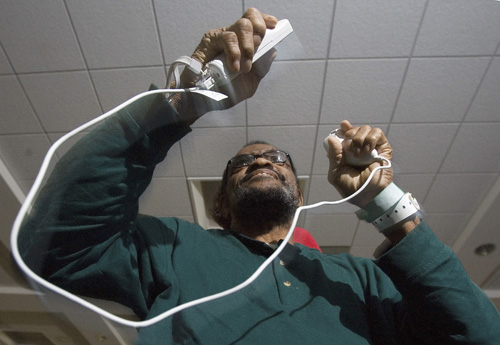Southern Illinois rehab center uses Wii to aid with recoveries

Billy Perry uses the Nintendo Wii Sports Boxing game for treatment following a stroke at WakeMed Hospital in Raleigh, N.C., on Jan. 21. Jonathan Fredin, The Associated Press
Feb 8, 2008
Last updated on May 12, 2016 at 09:12 p.m.
CHICAGO – Some call it “Wiihabilitation.”
Nintendo’s Wii video game system, whose popularity already extends beyond the teen gaming set, is fast becoming a craze in rehab therapy for patients recovering from strokes, broken bones, surgery and even combat injuries.
The usual stretching and lifting exercises that help the sick or injured regain strength can be painful, repetitive and downright boring.
In fact, many patients say PT – physical therapy’s nickname – really stands for “pain and torture,” said James Osborn, who oversees rehabilitation services at Herrin Hospital in southern Illinois.
Get The Daily Illini in your inbox!
Using the game console’s unique, motion-sensitive controller, Wii games require body movements similar to traditional therapy exercises. But patients become so engrossed mentally they’re almost oblivious to the rigor, Osborn said.
“In the Wii system, because it’s kind of a game format, it does create this kind of inner competitiveness. Even though you may be boxing or playing tennis against some figure on the screen, it’s amazing how many of our patients want to beat their opponent,” said Osborn of Southern Illinois Healthcare, which includes the hospital in Herrin. The hospital, about 100 miles southeast of St. Louis, bought a Wii system for rehab patients late last year.
“When people can refocus their attention from the tediousness of the physical task, oftentimes they do much better,” Osborn said.
Nintendo Co. doesn’t market Wii’s potential use in physical therapy, but company representative Anka Dolecki said, “We are happy to see that people are finding added benefit in rehabilitation.”
The most popular Wii games in rehab involve sports – baseball, bowling, boxing, golf and tennis. Using the same arm swings required by those sports, players wave a wireless controller that directs the actions of animated athletes on the screen.
The Hines Veterans Affairs Hospital west of Chicago recently bought a Wii system for its spinal cord injury unit.
Pfc. Matthew Turpen, 22, paralyzed from the chest down in a car accident last year while stationed in Germany, plays Wii golf and bowling from his wheelchair at Hines. The Des Moines, Iowa, native says the games help beat the monotony of rehab and seem to be doing his body good, too.
“A lot of guys don’t have full finger function so it definitely helps being able to work on using your fingers more and figuring out different ways to use your hands” and arms, Turpen said.
At Walter Reed Army Medical Center, the therapy is well-suited to patients injured during combat in Iraq, who tend to be in the 19 to 25 age range – a group that’s “very into” playing video games, said Lt. Col. Stephanie Daugherty, Walter Reed’s chief of occupational therapy.
“They think it’s for entertainment, but we know it’s for therapy,” she said.
It’s useful in occupational therapy, which helps patients relearn daily living skills including brushing teeth, combing hair and fastening clothes, Daugherty said.
WakeMed Health has been using Wii games at its Raleigh, N.C., hospital for patients as young as 9 “all the way up to people in their 80s,” said therapist Elizabeth Penny.
“They’re getting improved endurance, strength, coordination. I think it’s very entertaining for them,” Penny said.
“It really helps the body to loosen up so it can do what it’s supposed to do,” said Billy Perry, 64, a retired Raleigh police officer. He received Wii therapy at WakeMed after suffering a stroke on Christmas Eve.
Perry said he’d seen his grandchildren play Wii games and was excited when a hospital therapist suggested he try it.
He said Wii tennis and boxing helped him regain strength and feeling in his left arm.





